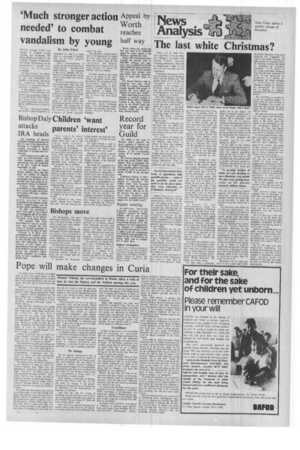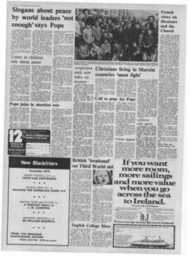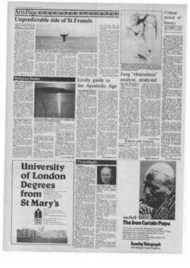Page 3, 5th January 1979
Page 3

Report an error
Noticed an error on this page?If you've noticed an error in this article please click here to report it.
Tags
Share
Related articles
Walsingham Walk
Guild Novena
Ransom Guild Agrees On Grants
Record Aid For Poorest Parishes
Guild Of Ransom Record
Record year for Guild
The Guild of Our Lady of Ranson which supports the poorer parishes of England and Wales will be able to make record grants of £19,500 this year because of the overwhelming success of its annual Novena Appeal.
The Novena Appeal, launched at the time of the Guild's WalsIngham Walk in September last year, and the Guild's Patronage Fund together raised more than £16,000 in 1978, an increase of almost £1,000 on the previous year.
Archbishop Dwyer of Birmingham described the Novena Appeal as "amazing". The Guild's fund's have increased steadily over thep ast ten years and Fr Anthony Stark, the Guild's Master said that he felt the increase was due to much more than inflation and "represents a genuine growth in support for the Guild's work".
Rights meeting
Archbishop Agostino Casaroli, secretary of the Vatican's Council for Public Affairs, will be one of the speakers at an international meeting on human rights in Geneva from January 23-25. The conference has been organised by Pax Romana in collaboration with several other groups. It aims to reflect upon the commitnient of Christians to the principles embodied in the UN Declration on human rights and to consider how to apply them.
Malawi seminarians
The diocese of Mzuzu, Malawi. in Central Africa, now has 35 students in its major seminary and 105 minor seminarians, according to Bishop J. Jobidon, Bishop of Mzuzu. The diocese recently ordained its 10th Malawian priest.
There will be little New Year optimism in the air when Mr Callaghan sits down with Jimmy Carter, Giscard d'Estaing and Helmut Schmidt in Guadeloupe today at the start of their two-day summit conference.
Dominating the agenda will be the two trouble spots of Southern Africa and the Middle East. The darkest cloud of all, for Messrs Callaghan and Carter in particular, is that hanging over Rhodesia, which for 13 years since the Unilateral Declaration of Independence has frustrated every attempt at a solution.
Now Mr Callaghan wilt have to report that the latest effort -the visit of Mr Cledwyn Hughes as his personal ambassador to Africa last month -has gone the way of all its predecessors, lost in the whirling bitterness of conflicting black and white in terests. The Anglo American plan in now to all intents and purposes dead.
The country is in the grip of a full scale civil war which only action by those directly involved can now resolve; outsiders can only watch, wait and, if it is their custom, pray.
It is a picture of almost unrelieved gloom with the brunt of the suffering being borne, as always, by those least equipped to do anything about it, the peasants in the rural areas.
They are the men in the middle, under pressure from both guerrillas demanding food and shelter and from security forces seeking information. They are liable to torture or death whichever side they help.
Whites living in the comfortable suburbs of Salisbury are still comparatively remote from the war. The capital, in the words of Dr Kenneth Slack, Director of Christian Aid, still feels like "an enlarged Welwyn Garden City in the southern hemisphere." Elsewhere, because of the customs of a lifetime and the official censorship of the media, the European population remains generally ignorant of the feelings of rural blacks.
The exceptions are the missionaries. Much has already been written about the dangers they face on remote mission stations, dangers highlighted again last week by the murder of Fr Gerhard Pieper, a German Jesuit, at Kangaire mission in the north cast. His death brought the total number of missionaries killed in the conflict to 33.
But what is less well known is the extent to which missionaries have come to some kind of working arrangement with guerrillas operating in their areas. There is a growing body of evidence to show that where local guerrilla commanders know and respect mission personnel, they have at least allowed, and in some cases even encouraged, the churches to continue their educational and medical work.
For their part both Robert Mugabe and Joshua Nkomo, the Patriotic Front leaders, have repeatedly said that they do not want the missions to close down and in an interview that I had with Mr Mugabe in London last year he said: "In no single case have I heard of our guerrillas being arrested because their presence was reported by missionaries."
Because Rhodesian laws demand that guerrilla activity be reported to the security forces and stringent penalities exist for non-compliance, it is impossible to name names. But I know of several missionaries who have met with guerrilla groups and come to some kind of agreement with them. This is hardly surprising in fact since there is a good chance that some of the guerrillas would be people who had been pupils at the mission school until a year or two ago and they have no wish to see the place where they had their education — or Christianity — destroyed.
In August last year representatives from the Rhodesian Bishops' Conference and the Justice and Peace Commission met the Patriotic Front leaders in Zambia. They judged then that a negotiated settlement was a definite possibility. By Christmas, however, that hope had receded into the far distance in the aftermath of the shooting down of the Viscount airliner and the subsequent massacre of 10 survivors followed by the air raids on camps in Zambia and Mozambique.
In a short term military sense those strikes represented a major victory for the Rhodesian forces. But in the long run they may be, seen as being decisive in sealing the fate of the biracial government set up last March by Mr Ian Smith, Bishop Muzorewa, Mr Sithole and Chief Chirau.
The raids killed a thousand people but as the Justice and Peace Commission pointed out in their December newsletter, to parents still in Rhodesia 1,000 deaths was not a victory. Attacking the weeklong display of the bodies on television and in newspapers, the Commission asked: "Did it ever occur to the jubilant people that from most of the Rhodesians the reaction was not "We have thumped the terrorists", but "Is my child among the dead?"
In the light of that, Bishop Muzorewa's enthusiastic endorsement of the raids did nothing to boost his sagging popularity. Nine months ago he had a big following but since then he has stumbled from one political gaffe to another, with such remarks as "Majority rule elections will not be postponed" (they were) and
"No call up of Africans before majority rule" (there has been). Altogether, despite a certain amount of bluster the bishop has proved powerless to make the promise of genuine black rule a reality.
The hesitancy with which the transitional government has moved with regard to the removal of racial discrimination has contrasted sharply with the speed with which the black call up has been implemented.
This is illustrated by a story told by Canon Herbert Sydenham, chairman of the Rhodesian group of the British Council of Churches, who accompanied Dr Slack to Africa before Christmas. He described a black civil servant who had moved into Salisbury and wanted to buy a house in exclusive suburb. He was granted a 100 per cent loan for a mortgage but later discovered that the much-vaunted changes meant in fact that while he could own a house there, he could not live in it!
Meanwhile, on the white side there is now a clear split within
Mr Smith's Rhodesia Front party following the resignation last week of Mr Rollo Hayman, the joint minister for Internal Affairs. Mr Hayman attacked Mr Smith for presenting an "unrealistic assessment" of the chances of any stable government emerging from the elections scheduled for April 20 and advocated the acceptance of a British administrator. Mr Smith retaliated by describing his former colleague's attitude as "defeatist and unbalanced" and accusing him of planning to emigrate, something that Mr Hayman hotly denied.
But if he did go, he would only be one of a growing number of whites who are now deciding to leave Rhodesia. Last month 70 went each day, putting yet more strain on the already stretched military forces.
The split now means that there is a real chance that Rhodesian whites could reject the policy taken by Mr Smith since last March, in the referendum on the new constitution planned for January 30. They may decide with Mr Hayman that the present government is doomed to failure.
To black disillusionment, white fears and military problems must be added the ease with which guerrillas have infiltrated vast areas of the country. The extent of their presence is indicated by the fact that the government has had to declare martial law over 80 per cent of the country.
Claims by the Patriotic Front that they are now in absolute control of large areas are exaggerated: according to Canon Sydenham, there is no area which is entirely under guerrilla control since the position is constantly shifting, but there is no doubt that guerrillas or their active sympathisers are to be found in every town and village.
All of this suggests that the Patriotic Front has now only to stay in the field to win the war outright.
The elections which were originally due on December 31 have been postponed until April 20, but now it is distinctly possible that the government may have to call them off again. If that occurs it could decide to cut its losses and try to come to an agreement with the Patriotic Front at last.
But if it does so, it will now have to be on the basis that minority rule, in whatever guise, disappears completely. In effect that means surrendering power to the Patriotic Front.
Opinions outside Rhodesia will differ sharply about that. Some will regard it as the coming of the Kingdom, others equally apocalyptically as a surrender to the Devil in the shape of "Marxist terrorism".
But by this time next year Rhodesians themselves will probably have little time for such considerations. For they will be engaged in rebuilding a country whose economic, social and political life has been torn apart by years of mistrust and missed opportunities.
blog comments powered by Disqus











